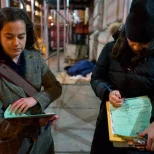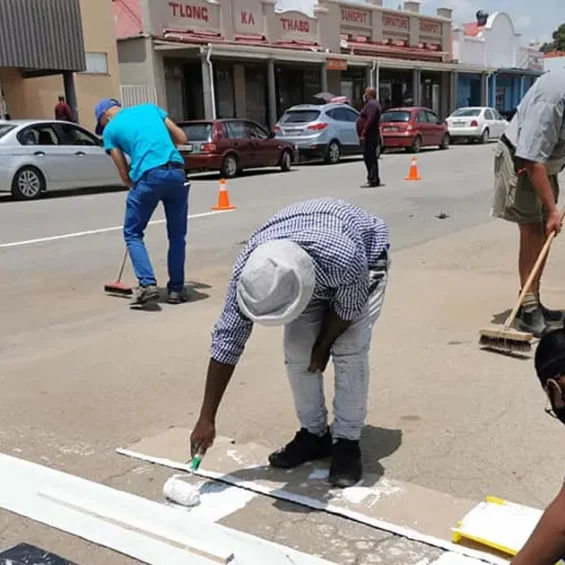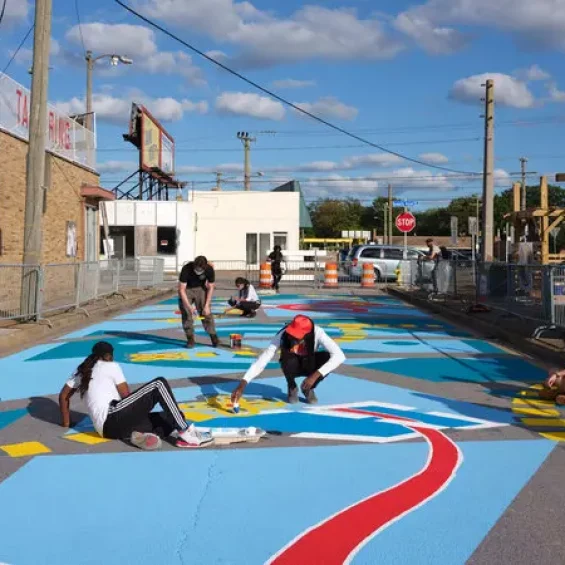What we do
We are your Community Thought Partners
The problems that communities need to resolve are complex, requiring comprehensive solutions. Addressing issues like health promotion and chronic disease prevention requires the inclusion of people from diverse backgrounds and disciplines.





Social norms approach to
CHANGE
A social norms approach to change requires identifying behaviors you would like a group of people to adopt, while increasing perceptions of that behavior as something members of their group do or are starting to do.

ECONOMIC
DEVELOPMENT
A majority of problems people face are a direct result of poverty. When people leverage their money, talents, and resources together to benefit a common interest we can create a sustainable infrastructure that promotes financial resilience and generational health and wealth.
- Financial Literacy training
- Community Benefit Agreements & Negotiations
- Tuition Free Skills Training, Certifications & Apprenticeship Programs
- Business Mentoring- Help you start, grow, or transition your business
- Job readiness



Peer
SUPPORT
Peer support workers can help break down barriers of experience and understanding, as well as power dynamics that may get in the way of working with other professional service providers who are mandated reporters. The peer support worker’s role is to assist people with finding and following their own life plans, without judgment, expectation, rules, or requirements.
- Empowerment
- Finding a voice
- Increased confidence and self-esteem
- Finding a source of hope and optimism
- Companionship and friendship
- Reduced isolation
- Mutual understanding, shared identity and shared experience
- A sense of belonging
- Collective action / campaigning – challenging the status quo
- Creating new knowledge and questioning dominant models
- Accessing information and advice
- Learning new skills and strategies
- Signposting to other sources of help and information
- Increased social networks and social inclusion
- Citizenship
- Challenging stigma and discrimination
- Achieving a sense of justice and equality in society

EQUITY
ADVOCACY
Inequity is at the root of most consequential disparities in health, wealth, and opportunity. However, advancing equity in communities is challenging. It requires a widespread embrace of collective responsibility, a commitment to diversity and inclusion.



COMMUNITY HEALING AND RESILENCE
TRAINING
Shared negative experiences associated with certain community characteristics, such as poverty, failing schools, unsafe streets and parks, or lack of good nutrition. To optimize health, safety and opportunity, the origins of community trauma, toxic stress and Adverse Childhood Experiences must be assessed, understood and prevented through trauma-informed policy and systems change.
- ACE's Adverse Childhood Experiences
- Community Trauma
- Toxic Stress

LOCAL RESOURCES & SERVICES
REFERRALS
Many service providers are missing the mark because they do not have a effeciently affective way of reaching those who need their services. We have solved this problem through our Peer Support Program. Our Warm hand-off Policy ensures that those who need help most do not fall through the cracks.



YOUTH
MENTORING
Positive youth development research has long demonstrated that youth benefit from close, caring relationships with adults who serve as positive role models. Mentoring provides youth with mentors who can develop an emotional bond with the mentee, have greater experience than the mentee, and can provide support, guidance, and opportunities to help youth succeed in life and meet their goals
Youth Sports Music Lesson Field Trips Scholarships Tutoring $1 an "A" program are Coming soon!

cOMMUNITY
ORGANIZING
I Am Love is firmly committed to ensuring that community-level work is guided by residents rather than a “top-down” approach where a funder makes decisions for a community. The goal of I Am Love is for residents to become empowered and gain capacities to change upstream issues, thereby improving their quality of life. Procedurally, this is achieved through an intentional and iterative transfer of knowledge between I Am Love coaches, organizational leads, and residents.



MEDIA
ADVOCACY
In an age where a cell phone is referred to as people’s second brain. I Am Love utilizes Media advocacy as one of its most effective tools in community revitalization at an environmental level by disseminating policy-related information through the communications media, especially where the aim is to effect action, a change of policy, or to alter the public’s view of an issue.

cOMMUNITY
LIASONS
As we build commuinity capacity, empower, and teach residents how to advocate for themselves. At times I Am Love Organizers may act as a reverse Community Liasons by managing communication between the public and an organization, such as a police department, school, or social services department. To remind residents and service providers that they are not alone.



data analysis &
COLLECTION
I Am Love prides itself on providing some of the most accurate and highest quality data in the world. We use data to substantiate our premise to decision makers. Our data is what sets our Media Advocacy a part and fuels the Love Movement.

Strategic
PLANNING
Strategic planning provides a roadmap for implementing outcome-driven prevention programs and advocacy campaigns. I Am Love facilitates a rigorous strategic planning process designed to advance goals related to equity, health, safety, opportunity, and quality of life at the population level. The process includes visioning, setting goals, identifying SMART objectives, mapping assets, assessing resources, and establishing a capacity building plan. Our process produces a flexible roadmap for the data collection, advocacy campaigns, community building, media advocacy, and policy work necessary to create sustainable systemic change.



Disaster
PREPAREDNESS
Underserved Communities are traditionally the least prepared when disasters happen. We make sure these communities are prepared for anything. Our Certified Disaster and Response team equips neighborhoods with a set of measures undertaken in advance to respond better and cope with the immediate aftermath of a disaster, whether it be human-induced or caused by natural hazards. The objective is to reduce the loss of life and livelihoods.

POLICY ADVOCACY &
SYSTEMS CHANGE
We endeavor for transformations in the policies, practices, power dynamics, social norms or mindsets that underlie the societal issues that prevent people from thriving. Focus on policy creates sustainability.


CIVIC
ENGAGEMENT
I Am Love has NO political party affiliation. However, it is of utmost importance for residents to participate in a democratic society to empower themselves and increase self-determination.
We educate the community on how government works. The roles and responsibilities of the various offices at the different levels of government.

THIRD PARTY
EVALUATIONS
As your community thought partners we help other businesses, for-profit and not, private and government evaluate the services and programs they provide.
We also conduct covert evaluations to substantiate allegations of discrimination, abuse or any other criminal activity suspected.

HEALTH AND NUTRITION
RESOURCES AND EDUCATION
Health and Wellness rest as the cornerstone of an individual’s ability to thrive. Physiology plays such a significant role in reaching one’s potential that I Am Love we will liaise with your doctor, hospital, and other facilities to ensure your care is carefully coordinated and will create a care plan that is tailored to your specific situation. We provide healthy food at free or low cost delivered to the door or within walking distance to remove any financial or transportation barriers.
- Health In All Policy Advocacy
- H.E.A.L. Healthy Eating Active Living
- Preventative Care Program- Free and Low Cost Health Evaluations

SUBSTANCE MISUSE & Stigma
PREVENTION
Substance use, trauma, and mental health disorders are intrinsically linked. Our prevention strategies focus on youth. However, we refer those who suffer from substance misuse disorder to treatment programs and provide supportive services.
We fight to eliminate stigma and work diligently to change the drug culture that teaches us to seek drug use for every emotion we experience. Instead, utilize non-pharmesutical treatment and coping skills when possible.
We advocate for policies that promote treatment and rehabilitation over punishment and condemnation.
- Harm Reduction
- Education
- Assesments

NEIGHBORHOOD
BEAUTIFICATION
Although this may be our most downstream program, the psychological effects on a neighborhood are invaluable. Broken Window Theory has been corroborated over and over again. No other program galvanizes a community and empowers residents quicker than the small win of cleaning up one’s neighborhood.
As we move further upstream, we implement a recycling program to offset the cost of the Community House and fund other neighborhood endeavors.
Other beautification strategies include:
- Community Fruit Tree planting
- Greenspace development
- Adopt a street program

free OR low cost
LEGAL ASSISTANCE
I Am Love partners with Law Firms to provide in-person and remote legal services and consultations on a monthly basis at our Community Houses.
Access to legal representation is a basic human right. It is fairly clear that access to legal services in the United States is inadequate. In its present state, the majority of
individuals who are unable to obtain counsel on their own are left without a fair chance at legal recourse in a wide array of legal proceedings. The consequences are many, but none as troubling as the effects on the basic human rights of individuals without access to quality legal representation.

HOUSING
ASSISTANCE
Housing is a Human Right. Housing is critical to many other facets of life, including physical and mental health, quality of life, access to education, and economic outcomes, among many others. Given this role, safe, stable, and affordable housing is a necessity for achieving many other human rights, including security and safety.

SOCIAL
JUSTICE
Our objective of creating a fair society in which each individual matters, their rights are recognized and protected, and decisions are made in fair and honest ways rests at the core of what Love is, Selflessness.



Technical skills/ Computer literacy
TRAINING
We now live in a digital world. Many have seamlessly transitioned as technology advanced and has become part of our everyday lives.
However, there is a large population of computer-illiterate people, mostly comprised of Seniors and underserved communities. Whose lives will be severely impacted, or lives can be greatly improved through the use of technology.
- Our training includes software such as Microsoft and Google suites, ZOOM, Internet Browsers, and more.
- Free or low-cost Technical Support & Repairs
- How to operate various hardware ie. Iphone, Android, PC, MAC
- Virtual online support

Art & Music
LESSONS
Art and music are critical for our youth. Whether they are exposed to art and music in school or through private or community classes and lessons, the benefits are incredible. Art and music exposure does more than provide a creative outlet for kids; they provide mental, emotional, and educational benefits and more.
Local understandings and interpretations of a community’s history reflect past events that feed into, and are partially driven by the demands, sentiments, and interests of those in the present. This makes it crucial for community development practitioners to consider the importance of culture in efforts to improve local well-being. By paying attention to, and incorporating unique cultural values, traditions, and related factors, more efficient and effective development efforts can be achieved.
- Free or low cost Piano lessons
- Asphault Art
- Community Murals



